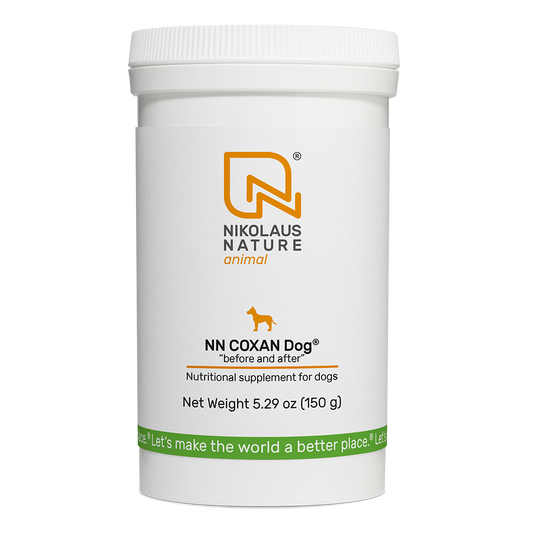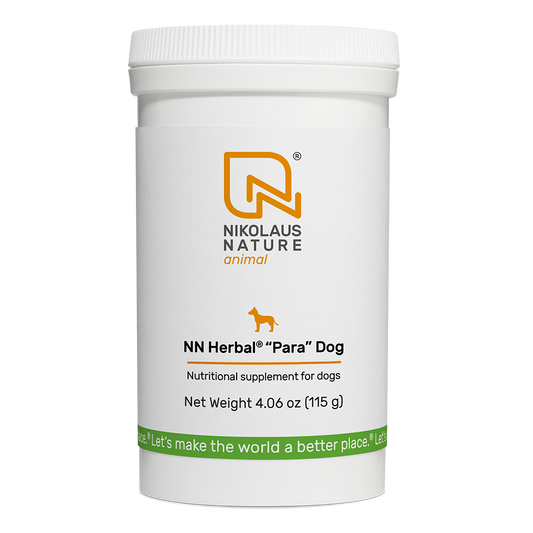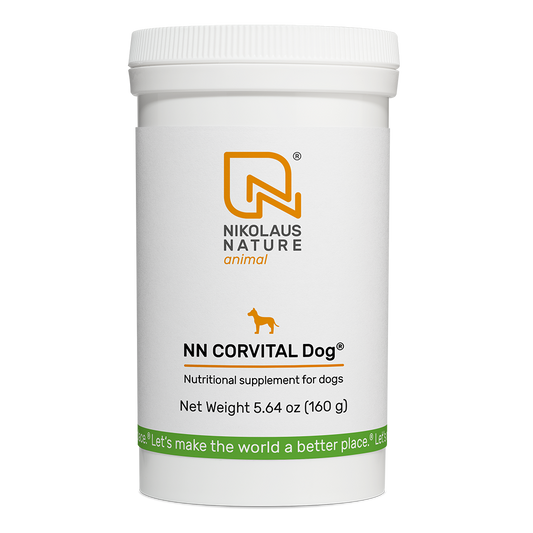Olive Oil for Dogs: Is It Safe for All Breeds and Ages?
Olive oil is known for its health benefits in the human diet, but did you know it can also be beneficial for our dogs? People have been using this liquid gold for centuries, with records of its use dating back to ancient civilizations.
Studies have shown that olive oil can provide a range of advantages for dogs. From supporting skin and coat health to boosting the immune system and aiding digestion.
But is it safe for all dogs, and how much should you give them? Keep reading to learn the benefits of olive oil for dogs and how to safely add it to your dog’s diet.

Is Olive Oil Safe for All Dogs?
Olive oil is generally considered safe for all dogs when given in small amounts. Also, it's important to use the right kind of olive oil. For example, extra-virgin olive oil is the best type. It undergoes less processing and has the highest levels of antioxidants and other beneficial compounds.
However, it's important to note that "safe" doesn't equal "universally beneficial." It is less suitable for some dogs that have sensitive stomachs or underlying health conditions. So, it's important to gradually introduce olive oil and watch for any adverse reactions.
For example, dogs with pancreatitis or those who easily gain weight may need to avoid or limit olive oil due to its fat content. If your dog has any pre-existing health conditions, consult your vet before adding olive oil or any new supplement to their diet.
7 Nutritional Benefits of Olive Oil for Dogs
Olive oil isn't just for humans - it can offer many health benefits for our dogs as well.
Shiny & Healthy Coat
Feeding dogs olive oil is good for their skin and fur. It is rich in monounsaturated fatty acids such as oleic acid, as well as antioxidants like vitamin E and polyphenols. These antioxidants can help fight inflammation and stress in the body that causes skin problems. These nutrients in olive oil help to nourish and hydrate the skin. It also reduces dryness, flakiness, and irritation.
Studies have shown that olive oil in dogs significantly increases the serum oleic acid and cutaneous levels in the body – which may improve coat health and appearance.
Add a small amount of olive oil to your dog’s diet and you can notice an improvement in its coat quality, with the fur becoming softer, smoother, and more manageable.
Joint Comfort & Mobility
Another benefit of olive oil is to support joint health and mobility in dogs, particularly in older or larger breed canines that are more likely to get joint issues like osteoarthritis.
The anti-inflammatory properties of olive oil can reduce swelling and joint pain. Studies have shown that dogs with osteoarthritis who were fed olive oil experienced improved joint function and reduced discomfort.
Olive oil contains healthy fats that lubricate the joints and maintain flexibility in dogs. This allows a greater range of motion and ease of movement. This can be particularly beneficial for senior dogs or those with joint-related mobility issues.
Reduce Allergies from Itching
Olive oil is a natural remedy that gives relief to itching and allergy symptoms such as hot spots, hair loss, and dry skin. The antioxidants present in olive oil – particularly polyphenols – reduce inflammation.
These antioxidants neutralize free radicals. These molecules are responsible for causing inflammation and oxidative stress in the body.
Improve Digestive Health
The monounsaturated fats present in olive oil lubricate the complete digestive tract. This increases the regular bowel movements and prevents constipation.
Research suggests that olive oil can increase protein digestion and utilization in adult dogs. Provides better overall nutrient absorption and potentially improves their overall health. Plus, the antioxidants prevent gastrointestinal issues such as inflammatory bowel disease and colitis.
Helps Lose Weight
Olive oil helps dogs achieve and maintain a healthy weight. The monounsaturated fats break down fat cells and reduce the accumulation of fat in the body which decreases body fat percentage and a reduction in the risk of obesity-related health issues such as arthritis, diabetes, and heart disease.
Moreover, the polyphenols in olive oil increase insulin sensitivity. This can assist in regulating blood sugar levels and prevent the onset of insulin resistance.
Boost Brain
Olive oil has a positive impact on canine cognitive function. The polyphenols present in olive oil have neuroprotective effects. It improves brain function and reduces the risk of cognitive decline due to age.
This is particularly important for older dogs, as cognitive decline causes behavioral changes, memory loss, and other issues.
Support Immune System
The antioxidants in olive oil reduce oxidative stress and inflammation. That can weaken the immune system and increase the risk of illness. And, the omega-3 fatty acids present in olive oil support immune function and help to reduce the risk of infections and diseases.

How Much Olive Oil Should I Give My Dog?
When it comes to feeding olive oil to your dog, moderation is key. The perfect amount of olive oil for your dog depends on several factors: their size, weight, and activity level. It's a good idea to start small and gradually increase the amount.
A rule of thumb is 1/4 tsp per 10 lbs of your dog's weight, given daily, mixed into their food. However, it's important to monitor your dog's reaction, as some dogs may be more sensitive to the laxative effects of olive oil. If you notice any digestive upset, such as diarrhea or vomiting, discontinue use and consult your veterinarian.
Olive oil is dense in calories. It contains about 124 calories per tablespoon. So avoid giving your dog too much. it's important to factor these additional calories into your dog's overall daily intake to prevent weight gain.
Remember, these are just guidelines, and the ideal amount for your dog may vary. If your dog is overweight or less active, a smaller amount may be sufficient. On the other hand, more active dogs or those with skin or coat issues may benefit from a slightly higher dose.
What's the Best Way to Give My Dog Olive Oil?
The best way to give olive oil to your dog is to mix it into their regular food, whether that's kibble, wet food, or homemade dog food. This prevents your dog from inhaling it or eating it too quickly – which could lead to choking or an upset stomach.
You can also try making homemade dog treats with olive oil. This is a fun way to give your dog olive oil as a tasty treat. Just be sure to follow a recipe designed for dogs and avoid any ingredients that are toxic to canines.
If your dog is a picky eater, you can spread a little olive oil over their meal to make it more appealing. The healthy fats can also help improve the consistency of dry food.
Some other tips for safely giving your dog olive oil:
- Avoid applying olive oil directly to your dog's skin or coat, as they will likely lick it off
- Store the olive oil in a dark bottle away from heat to prevent it from going rancid
- Always use extra virgin olive oil (EVOO) of high quality for the most benefits
- Consult your veterinarian before making olive oil a regular part of your dog's diet
- Watch for signs of digestive upset like vomiting or diarrhea, and discontinue use if this occurs
No matter how you choose to give your dog olive oil, always stick to the recommended dosage based on their weight. Too much olive oil can cause digestive upset. With the right approach, olive oil can be a safe and beneficial addition to your dog's diet.
How to Choose the Right Olive Oil for Your Dog
Here are some different types of olive oil to select for your dog:
Extra Virgin Olive Oil (EVOO)
EVOO is the purest type of olive oil. It is the least processed, that's why it retains the highest levels of beneficial nutrients like vitamins, antioxidants, and healthy monounsaturated fats.
EVOO is produced without the use of heat or chemicals – preserving its natural goodness. Look for EVOO that is packaged in a tinted bottle (preferably glass) without harmful ingredients.
Virgin Olive Oil
Virgin olive oil is another good option for dogs. However, it is slightly more processed than EVOO. Virgin olive oil still contains many of the beneficial compounds found in EVOO but at slightly lower levels.
Refined Olive Oil
Refined olive oil is not recommended for dogs, as it has undergone more extensive processing with heat and chemicals to remove impurities. This type of olive oil has a higher smoke point and a more neutral flavor, but it lacks the antioxidants and nutrients found in virgin and extra-virgin varieties.
Storage and Expiration
To preserve the quality and freshness of olive oil, it should be stored in a dark bottle away from heat and light. EVOO can go rancid faster than other varieties, so it's important to check the expiration date and use it within a few months of opening. When choosing olive oil for your dog, look for a high-quality EVOO or virgin olive oil from a reputable brand.

Is Olive Oil Bad for Dogs? Risks and Side Effects
While olive oil can offer some health benefits for dogs, it's important to be aware of the side effects that also come with its use:
Gastrointestinal Upset
While a small amount of olive oil can help relieve constipation in dogs, too much can cause diarrhea or vomiting. Dogs with sensitive stomachs may not tolerate olive oil well, even in small doses.
Weight Gain
Olive oil is high in calories (124 calories per tablespoon), so feeding more, is equal to more weight gain and it contributes to obesity in dogs. Obesity is associated with various health issues like heart disease, joint pain, and diabetes. If your dog is already overweight, it's best to avoid adding olive oil to their diet.
Pancreatitis
Because olive oil is a fat, excessive intake can trigger pancreatitis in dogs. Pancreatitis is a serious and painful condition that occurs when the pancreas becomes inflamed. Signs of pancreatitis include abdominal pain, vomiting, diarrhea, lethargy, and loss of appetite.
FAQ About Olive Oil for Dogs
Can I give my dog olive oil every day?
Yes, you can give your dog olive oil every day, but it's important to start with a small quantity and increase the dosage gradually. However, you should consult your veterinarian before making olive oil a regular part of your dog's diet, and monitor your dog for any digestive issues or allergic reactions.
Can I put olive oil on my dog's paws?
Yes, olive oil can be applied to your dog's paws to moisturize dry and cracked pads, soothe irritation, and promote healing. However, keep in mind that dogs often lick their paws, so excessive ingestion of olive oil could lead to digestive upset. To minimize this, apply a small amount, massage it in well, and consider using a bootie or sock to prevent immediate licking.
Is olive oil good for dogs' ears?
While olive oil is sometimes suggested as a home remedy for cleaning dog ears, it's generally not recommended. Although it may help soften earwax, it can also trap debris and moisture, potentially worsening existing ear problems or infections. And, Olive oil is not an effective treatment for ear mites or infections, instead, it can mask underlying issues that require veterinary attention.
Sources:
-
In the ancient world, virgin olive oil was called “liquid gold”,
"https://www.sciencedirect.com/science/article/abs/pii/S0963996914003494" -
The benefits of virgin olive oil for dogs,
"https://ivcjournal.com/benefits-virgin-olive-oil-dogs/#google_vignette" -
Effects of oral sunflower oil and olive oil on serum and cutaneous fatty acid concentrations in dogs,
"https://pubmed.ncbi.nlm.nih.gov/1439206/" -
Inflammatory Arthritis,
"https://www.ncbi.nlm.nih.gov/books/NBK507704/" -
Protein digestibility in dogs. Effect of the quantity and quality of dietary fat (virgin olive oil and sunflower oil),
"https://onlinelibrary.wiley.com/doi/abs/10.1002/food.19910350208" -
Dietary Polyphenols as a Protection against Cognitive Decline,
"https://www.ncbi.nlm.nih.gov/pmc/articles/PMC10215267/" -
Responses of dogs to dietary omega-3 fatty acids,
"https://pubmed.ncbi.nlm.nih.gov/18052798/" -
The Short-Term Effects of Olive Oil and Flaxseed Oil for the Treatment of Constipation in Hemodialysis Patients,
"https://www.sciencedirect.com/science/article/abs/pii/S1051227614001411" -
U.S. DEPARTMENT OF AGRICULTURE,
"https://fdc.nal.usda.gov/fdc-app.html#/food-details/1103861/nutrients"







